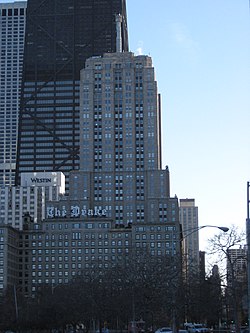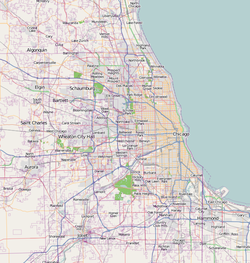Palmolive Building
|
Palmolive Building
|
|

The Palmolive Building
|
|
| Location | 919 N Michigan Avenue, Chicago, IL 60611, USA |
|---|---|
| Coordinates | 41°53′59.41″N 87°37′25.94″W / 41.8998361°N 87.6238722°WCoordinates: 41°53′59.41″N 87°37′25.94″W / 41.8998361°N 87.6238722°W |
| Built | 1929 |
| Architect | Holabird & Root |
| Architectural style | Art Deco |
| NRHP Reference # | 03000784 |
| Significant dates | |
| Added to NRHP | August 21, 2003 |
| Designated CL | February 16, 2000 |
The Palmolive Building, formerly the Playboy Building, is a 37-storey Art Deco building at 919 N. Michigan Avenue in Chicago. Built by Holabird & Root, it was completed in 1929 and was home to the Colgate-Palmolive-Peet corporation.
The Palmolive Building was renamed the Playboy Building in 1965 when Playboy Enterprises purchased the leasehold of the building. It was home to the editorial and business offices of Playboy magazine from that time until 1989 when Playboy moved its offices to 680 N Lake Shore Drive. Playboy had sold the leasehold in 1980 and signed a 10-year lease that expired in 1990. The new leaseholder renamed the building 919 North Michigan Avenue.
During the time that Playboy was in the building, the word P-L-A-Y-B-O-Y was spelled out in 9-foot (2.7 m) illuminated letters. The building was designated a Chicago Landmark in 2000, and it was added to the federal National Register of Historic Places in 2003.
In 2001, the building was sold to developer Draper and Kramer who, with Booth Hansen Architects, converted it to residential use with the first two floors dedicated to upscale office and retail space. High-end condos make up the rest of the building. The new owners restored the building's name to the Palmolive Building. The business address remains 919 North Michigan Avenue; however, the residential address is 159 East Walton Street. Notable residents of the building include Vince Vaughn, who bought a 12,000-square-foot triplex penthouse encompassing the 35th, 36th and 37th floors for $12,000,000. In February 2013, Vaughn offered the penthouse for sale as a pocket listing for $24.9 million. However, after multiple price cuts he chose in May 2016 to divide the unit in two, offering one for $8.5 million, and the other smaller unit for $4.2 million.
A beacon named for the aviator Charles Lindbergh was added to the building in 1930. It rotated a full 360 degrees and was intended to help guide airplanes safely to Midway Airport. The beacon beamed for several decades, and ceased operation in 1981 following complaints from residents of nearby buildings. During the Palmolive Building's conversion to condominiums in the late 2000s, the beacon was modified to rotate back and forth, always pointing at the lake, so as to avoid shining light into other buildings. Subsequently, the historic beacon resumed operation.
...
Wikipedia



